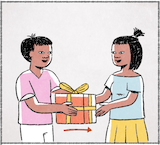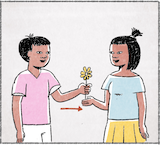

เขากำลังเฮ็ดหญังสองคนนี้ กะมีพุหญิงกับพุซายเนาะ เขากำลังให้ของขวนกัน
กะมีพุซายคนหนึ่งถือของขวนก่องบักใหญ่เอาโลด ก่องสีแดง มีผูกลิบบิ้นพ้อมพุ้นแหล้ว สีเหลียงเอ้อเฮ้ออยู่
ก่องบักใหญ่พุ้นแหล้วของขวน จักอี่หยังอยู่ในหั้น
กะเป็นพุซายเนาะ ถือให้ กำลังสิเด่ให้พุหญิง เด่ของขวนนี้หละ เด่ของขวนก่องสีเหลียงใหญ่ๆ หนิหละเอาให้พุหญิง
แล้วเขาให้ในวันอี่หยัง หลือว่าในเนี้ยงโอกาดอี่หยัง กะเญียงว่า อาดสิเป็นแบบว่าในวันเกิด หลือว่าวันเลียนจบ หลือว่าวันอี่หยังกะได้ที่เหมาะสม หลือว่าที่สามาดให้ของขวนกันได้เนาะ
10
เขากำลังเฮ็ดหญัง กะมีพุซายพุหนึ่งกำลังเด่ดอกไม้ให้พุหญิงเนาะ กำลังเอาดอกไม้ให้พุหญิง
มีดอกเดียว ดอกงามซ้ำแมะ มีดอกเดียว ดอกสีเหลียงพ้อม กำลังเด่ไปพุหญิง
แล้วพุหญิงกำลังสิเด่มือมาลับเอาเนาะ กำลังสิลับเอาดอกไม้นั้นเนาะ
แล้วพุซายเอาดอกไม้นี้ให้พุหญิงเฮ็ดหญัง กะจักคือกัน พุซายคนนี้อาดสิมักพุหญิงคนนี้กะได้ กะเลยเอาดอกไม้ไปมอบให้ หลือว่าไป เอาไปยื่นให้พุหญิงคนนี้เนาะ
Link to overview page
Link to dictionary
| Isaan | Pronunciation | Tones | Thai | English/Notes |
|---|---|---|---|---|
| เขา | khao | M | เขา | personal pronoun: he, she |
| กำลัง | gam-laŋ | M-HR | กำลัง | auxiliary indicating continuous or progressive action |
| เฮ็ด | het | H | ทำ | to do, to make |
| หญัง | ɲaŋ | M | อะไร, เป็นหญัง = ทำไม | 1. what {เขากำลังเฮ็ดหญัง = What is he doing?} {ธูปเอาไว้เฮ็ดหญัง = What are incense sticks for?} 2. something, anything, (nothing) 3. เป็นหญัง[...]คือ in initial position: why {เป็นหญังเขาคือใส่บักพิกลงไปในกวยเตียว = Why is he putting chili in [his] noodle soup?} {เป็นหญังหน้าต่างมันคือเปิด = Why is the window open?} {เป็นหญังมันคือมีควนไฟ = Why is there smoke?} |
| สอง | sɔ:ŋ | M | สอง | two |
| คน | khon | HR | คน | person, people |
| นี้ | ni: | HF | นี้ | 1. this 2. here |
| กะ | ga | M | ก็ | 1. then, consequently 2. also |
| มี | mi: | HR | มี | 1. to have 2. there is |
| พุหญิง | phu-ɲiŋ | H-M | ผู้หญิง | woman, female |
| กับ | gap | M | กับ | 1. and {ลุงกับป้า = uncle and aunt} {กวยเตียวหมูกับกวยเตียวไก่ = noodle soup with pork and noodle soup with chicken} 2. with, to {ค้ายๆ กับคำว่า ... = similar to the word ...} 3. prefix in front of foods {กับเข้า = side dishes eaten with rice} {เขากินกับกวยเตียว = he's eating noodle soup} |
| พุซาย | phu-sa:i | H-HR | ผู้ชาย | man, male |
| เนาะ | nɔ | H | เนาะ | final particle: makes the statement softer, looking for agreement |
| ให้ | hai | LF | ให้ | 1. to give {หมอกำลังเอายาให้คนป่วยกิน = the doctor is giving the patient medicine} 2. for 3. to allow, to be allowed |
| ของขวน | khɔ:ŋ-khu:an | M-M | ของขวัญ | gift, present |
| กัน | gan | M | กัน | mutual, each other, with another, together {เขากำลังนั่งเว้ากัน = they're sitting and talking} {เขาสองคนฮักกัน = they love each other} {ปาสองโตนี้ ใหญ่ห่างกันหลายบ่ = These two fish here, are they very different in size (from each other)?} {ต่างกัน = to be different (from each other)} {ก่องอันไหนหนักกว่ากัน = Which box is heavier (than the other(s))?} |
| หนึ่ง | nʉŋ | H | หนึ่ง | 1. one 2. after adjective: intensifier {บักคักหนึ่ง = very much} {อันบักใหญ่หนึ่ง = very large}, or attenuates the meaning {กะดาดมันแผ่นน้อยๆ หนึ่ง = the piece of paper is [relatively] small} |
| ถือ | thʉ: | M | ถือ | 1. to hold 2. to carry 3. to regard as, to consider {สี่สิบองสาถือว่าฮ้อน = 40 degrees Celsius is considered hot} |
| ก่อง | gɔŋ | H | กล่อง | box, case, package |
| บัก | bak | M | 1. intensifier before adjectives {ปาโตบักใหญ่ = a (very) large fish} 2. prefix in front of fruits and vegetables {บักแตงโม = watermelon} 3. can be used as a reference for a male person of the same or younger age {บักอันนี้ = this lad} |
|
| ใหญ่ | ɲai | H | ใหญ่ | large, big |
| เอาโลด | ao-lo:t | M-HF | เอาเลย, ทำเลย, จริงๆ | in final position: intensifier {โตส่ำกะทะเอาโลด = [a fish] as large as the pan!} {เกียบเต็มถ้วยเอาโลด = the bowl is almost full!} {ทะนาคานมันสิไปตั้งไว้อยู่ซู่หม้องเอาโลด = banks are everywhere!} |
| สี | si: | M | สี | 1. color 2. colored pencil, crayon |
| แดง | dɛ:ŋ | M | แดง | red |
| ผูก | phu:k | LF | ผูก | to tie, fasten, bind, knot |
| ลิบบิ้น | lip-bin | H-HF | ริบบิ้น | ribbon |
| พ้อม | phɔ:m | HF | พร้อม | at the same time, also, too {มีตะเว็นพ้อม = the sun's out, too} {กะทะมีด้ามพ้อม = the pan has also a handle} |
| พุ้นแหล้ว | phun-lɛ:o | HF-LF | นู่นแหละ | auxiliary for emphasis at the end of a phrase Notes: variant of พุ้นหละ |
| เหลียง | li:aŋ | M | เหลือง | yellow |
| เอ้อเฮ้อ | ə:-hə: | HF-HF | color: very yellow | |
| อยู่ | yu: | H | อยู่ | 1. to be (located) at 2. yet, still 3. auxiliary indicating continuous or progressive action {ทอดปาอยู่ในกะทะ = (in the process of) frying a fish in the pan} {แม่กำลังเมี้ยนเฮียนอยู่ = mother is cleaning/tidying up the house} |
| จัก | jak | M | จัก | 1. answer to a question: [I] don't know, don't know exactly, [I'm] not sure {พุซายคนนี้เขาเถ้าไป่ จัก จักเถ้าหลือบ่เถ้า เบิ่งบ่ค่อยออก = Is this man here already old? I don't know. I can't see clearly whether he's old or not.} {เขาเว้ากันอยู่ใส จักคือกัน = Where are they talking? I don't know either.} 2. exact(ly), what exactly {จักต้มอี่หยังกะบ่ฮู้ = I don't know what (exactly) he is cooking} {บ่ลู้คือกันจักปาอี่หยัง = I don't know either what kind of fish this is} 3. how much/many? {ต้นไม้มีจักต้น = How many trees are there?} {ตอนนี้จักโมงแล้ว = What time is it now?} {มือของเฮานี้สิมีจักนิ้ว = How many fingers do our hands have?} 4. a bit, a little bit {จักหน่อย/จักหน่อยหนึ่ง = a bit, a little bit} |
| อี่หยัง | i:-yaŋ | H-M | อะไร | 1. what {นี้คืออี่หยัง = What is this?} {มื้อนี้เจ้าเฮ็ดอี่หยัง = What are you doing today?} {กินเข้างายกับอี่หยัง = What did you have for breakfast?} 2. something, anything, (in negations) nothing {บ่ต้องเฮ็ดอี่หยังอีกเลยนอกจากใส่ปุย = [we] don't need to do anything besides adding fertilizer} |
| ใน | nai | HR | ใน | in, within |
| หั้น | han | LF | ที่นั่น | there, over there |
| เป็น | pen | M | เป็น | 1. to be, to exist 2. to be able to 3. to suffer, sth. happens to 4. เป็นหญัง[...]คือ in initial position: why? {เป็นหญังเขากะคือแปงฟัน = Why is he brushing his teeth?} {เป็นหญังเคี่ยงบินมันคือสิตก = Why is the airplane falling down?} |
| สิ | si | M | จะ | future tense auxiliary {เขากำลังสิตื่น = he's about to wake up} {สิไปตะหลาด = [I'm] going to the market} |
| เด่ | de: | H | to stretch forward, to extend forward | |
| นี้หละ | ni:-la | HF-M | นี่แหละ | auxiliary for emphasis at the end of a phrase |
| หนิหละ | ni-la | M-M | นี่แหละ | auxiliary for emphasis at the end of a phrase Notes: variant of นี้หละ |
| เอา | ao | M | เอา | to take, to give {เขากำลังเอาก่องไปซั่ง = he's taking the boxes to weigh them} {หมอกำลังเอายาให้คนป่วยกิน = the doctor is giving medicine to the patient} {เอาไว้ถ้า = is for, is used for, has the purpose of} |
| แล้ว | lɛ:o | HF | แล้ว | 1. finished 2. already 3. and then, and next (especially แล้วกะ) 4. auxiliary for past tense |
| วัน | wan | HR | วัน | day Notes: used in names of days like Monday, Tuesday etc., otherwise มื้อ |
| หลือ | lʉ: | M | หรือ | or |
| ว่า | wa: | H | ว่า | 1. that, as {คำว่า X = the word X} 2. to say |
| เนี้ยง | ni:aŋ | HF | เนื่อง | connected with, due to, because of, as a result of |
| โอกาด | o:-ga:t | M-LF | โอกาส | opportunity, occasion, time |
| เญียง | ? | ? | ? | ? |
| อาด | a:t | LF | อาจ | 1. might, may, will 2. likely |
| แบบ | bɛ:p | LF | แบบ | 1. example, model, kind 2. style, form, pattern, design |
| วันเกิด | wan-gə:t | HR-LF | วันเกิด | birthday |
| เลียน | li:an | HR | เรียน | to study, to learn {เลียนหนังสือ = to study} {เลียนจบ = to graduate} {เลียนเก่ง = to be a good student} |
| จบ | jop | M | จบ | to end, to finish, to complete |
| ได้ | dai | HF | ได้ | 1. can 2. to get, to obtain 3. before verb: indicating past tense 4. บ่ได้ + verb: not |
| ที่ | thi: | H | ที่ | 1. that, which {คนที่ยืนอยู่ฝั่งขวา = the person which is standing on the right = the person standing on the right} {เว้าคำที่บ่สุพาบ = to speak words which are impolite = to speak impolitely} 2. for ordinal numbers {ที่สาม = third} |
| เหมาะสม | mɔ-som | M-M | เหมาะสม | appropriate, suitable |
| สามาด | sa:-ma:t | M-HF | สามารถ | can, to be able |
| พุ | phu | H | ผู้ | 1. person 2. clf. for people {พุหญิงพุหนึ่ง พุซายพุหนึ่ง = a woman, a man} {ซู่พุซู่คน = everybody} {พุหนึ่งโตจ่อยๆ พุหนึ่งโตบักอ้วนหนึ่ง = one person is slim, the other is fat} Notes: pronunciation: also realized as พู่- |
| ดอกไม้ | dɔ:k-mai | LF-HF | ดอกไม้ | flower |
| ดอก | dɔ:k | LF | ดอก | flower |
| เดียว | di:ao | M | เดียว | only, alone, single |
| งาม | ŋa:m | HR | สวย | beautiful, handsome, splendid |
| ซ้ำแมะ | sam-mɛ | HF-H | (ด้วย)แหละ | final particle used for emphasis Notes: also pronounced ซ้ำแม |
| ไป | pai | M | ไป | 1. to go 2. auxiliary indicating action extending into the future |
| มือ | mʉ: | HR | มือ | 1. hand 2. front leg/paw (e.g., of a cat) |
| มา | ma: | HR | มา | 1. to come 2. auxiliary expressing action towards the present or focal time {กะคุเฮ็ดมาจากอี่หยัง = What is the bucket made of?} {แล้วเขากะเก็บเงินจากพุนั้นมา = and then she takes the money of that person} |
| ลับ | lap | H | รับ | 1. phone: to answer a call 2. to receive, accept, pick up, take up Notes: see also ฮับ |
| นั้น | nan | HF | นั้น | that, there |
| คือกัน | khʉ:-gan | HR-M | เหมือนกัน | 1. also, likewise, similarly {ยินดีที่ได้ฮู้จักคือกันคับ = Nice to meet you too!} 2. in negative sentences: either {บ่ลู้คือกัน = I don't know either} {จักคือกัน = I don't know (either)} |
| มัก | mak | H | ชอบ | to like, to love, to want, to desire |
| เลย | lə:i | HR | เลย | 1. futher on, beyond, past {เข็มน้อยเลยเลขสิบสองไป = the minute hand has passed number twelve} 2. too much 3. at all 4. definitively 5. completely, utterly |
| มอบ | mɔ:p | HF | มอบ | to give Notes: polite register |
| ยื่น | yʉ:n | H | ยื่น | to hand sth. to so., to stretch out one's hand, to reach out for {เขากะสิยื่นแตงโมให้พุซายกิน = she hands the boy watermelon to eat} |